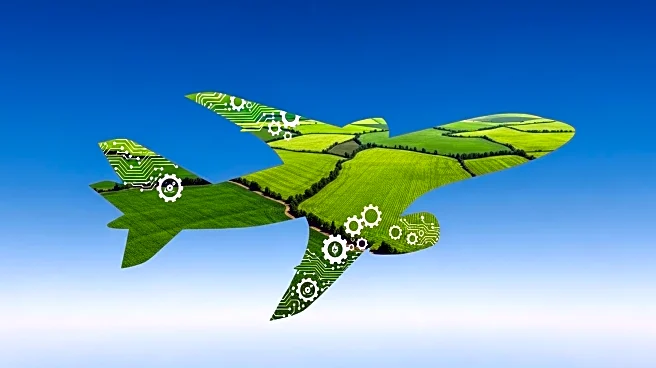What's Happening?
The Global Aerospace Summit in St. Louis showcased the role of agriculture and technology in developing sustainable aviation fuel (SAF). Industry leaders, including Dr. Yan Zhang from the National Corn-to-Ethanol Research Center and Jim Hedges from CoverCress Inc., discussed innovations in SAF production. The summit emphasized the use of crops and ethanol to create SAF, aiming to reduce emissions in the aviation sector. The St. Louis region's strategic advantages, such as proximity to agricultural stakeholders and a strong innovation community, were highlighted as key factors in advancing SAF research and development.
Why It's Important?
Sustainable aviation fuel is crucial for reducing the carbon footprint of the aviation industry, one of the most challenging sectors to decarbonize. The summit's focus on SAF underscores the growing demand for renewable fuels and the potential for agriculture and technology to drive innovation. Stakeholders, including farmers, researchers, and aviation companies, stand to benefit from advancements in SAF production, which could lead to economic growth and environmental sustainability. The development of SAF aligns with broader efforts to combat climate change and transition to cleaner energy sources.
What's Next?
The next steps involve scaling up SAF production and addressing challenges such as retrofitting facilities and encouraging farmers to adopt new crops. The industry is expected to see increased investment and innovation, with commitments from major companies like Bayer, Chevron, and Bunge. Continued collaboration between agricultural and technological sectors will be essential for meeting SAF demand and achieving emission reduction targets. The timeline for SAF adoption in aviation remains uncertain, but strong industrial commitments suggest significant progress in the coming years.
Beyond the Headlines
The summit highlights the intersection of agriculture, technology, and aviation, showcasing the potential for cross-sector collaboration to drive sustainable solutions. It raises ethical considerations about the role of innovation in addressing environmental challenges and the importance of supporting farmers in transitioning to new practices. The development of SAF could lead to long-term shifts in energy consumption and production, influencing global efforts to achieve climate goals.









